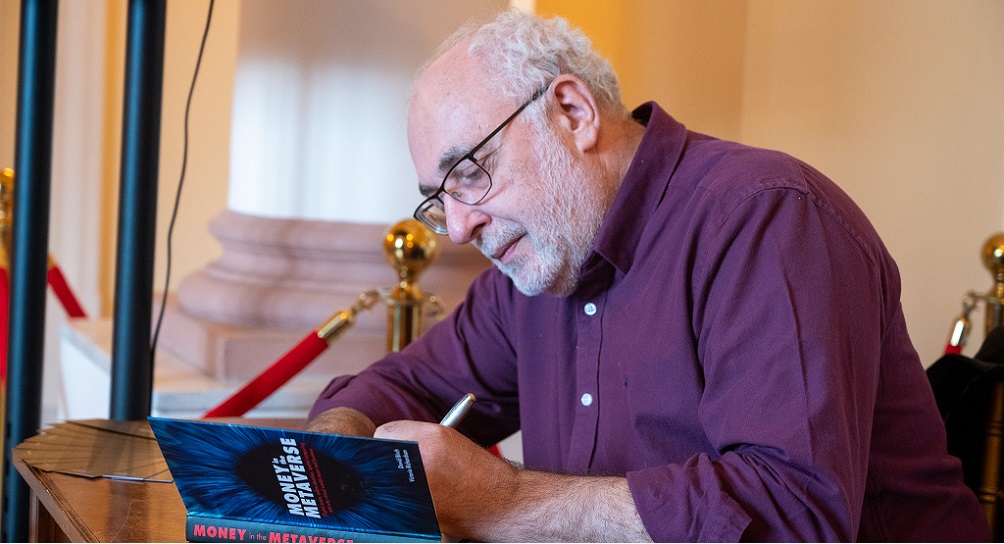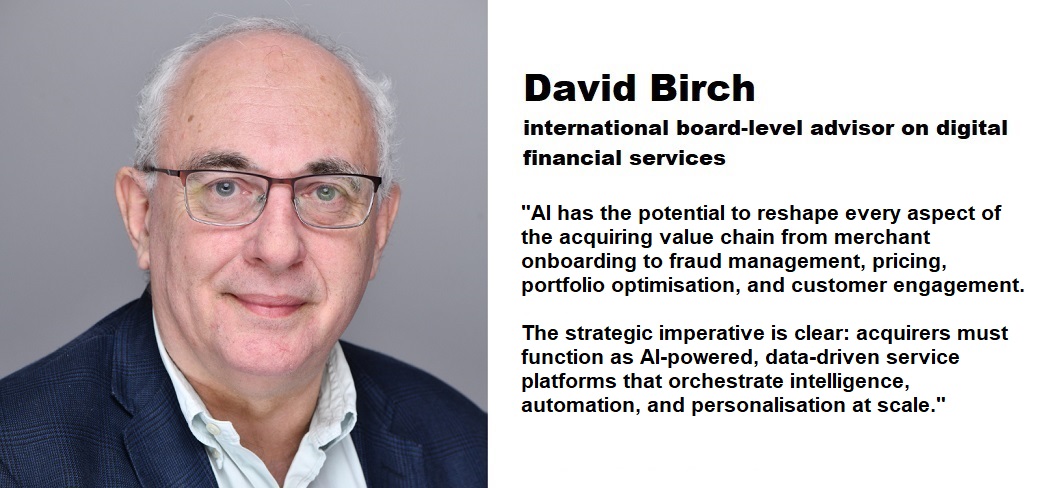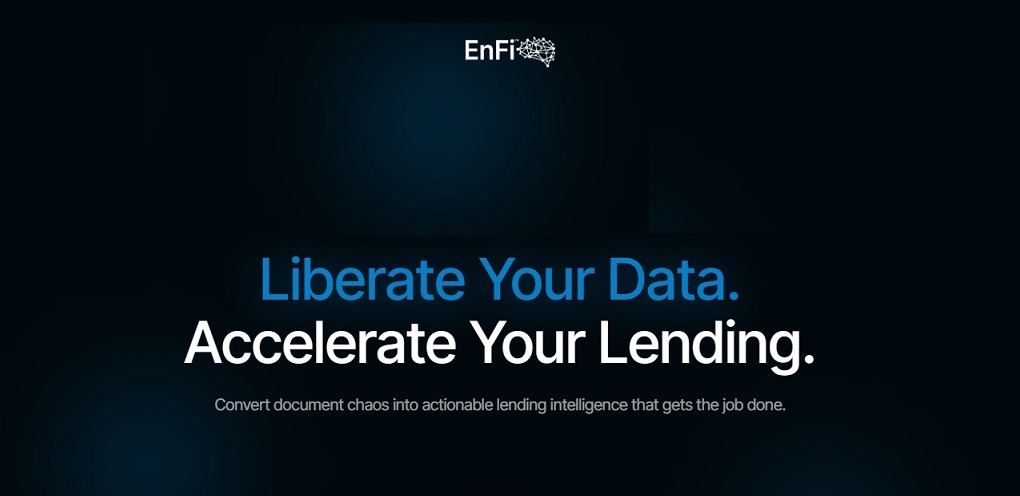Smart Glasses and Smarter Identity

We will soon be looking through the internet, not at it.
an article written by David Birch
In our book Money in the Metaverse, Victoria Richardson and I wrote that while your Apple Vision Pro will remain at your desk and replace your computer, smart glasses of one form or another will likely replace your mobile phone. Those comments may have seemed futuristic when the book came out last year, but now that Mark Zuckerberg is saying the same thing, I think that the financial sector should begin thinking about what this means for the next generation of services.
Victoria and I also quoted Louis Rosenberg (CEO of Unanimous AI) predicting that a decade from now people will laugh at images of us walking down the street staring down at a small screen because virtual and augmented reality (with layers of rich virtual content overlaid on the real world) will become the primary digital gateway, with the transition beginning in the middle of this decade. Here is what Mark Zuckerberg said about this at Meta’s annual Connect developer event:
I think that it’s pretty easy to wrap your head around [the idea that] there are already 1 to 2 billion people who wear glasses on a daily basis. Just like everyone who upgraded to smartphones, I think everyone who has glasses is pretty quickly going to upgrade to smart glasses over the next decade. And then I think it’s going to start being really valuable, and a lot of other people who aren’t wearing glasses today are going to end up wearing them, too.
Meta is embarking on a multiyear, multibillion-dollar effort to position itself at the forefront of connected hardware, and alongside its new and more affordable Oculus Quest 3S headset it showed off its improved, AI-powered Ray-Ban Meta smart glasses. I intend to get some of these as soon as I can, because (as more than one commentator has already noted) it’s the AI that makes their augmented reality proposition so powerful. As one reviewer wrote, the device shows us how we might soon access always-on computing, without the distracting wrist turns to look at a smartwatch, or palm turns to view a phone screen. It’s potentially disconcerting that the glasses might detach us even further from being present in real life.
I can use the same simple example that everyone else uses to make the point. I am good with faces and will generally recognise people that I’ve spoken with, although not always. I am terrible with names and it is slightly embarrassing to walk around an event or an office or (as happened recently) a corporate hospitality event saying hi to people that you know and like and then spending the first ten minutes of any conversation desperately trying to remember their name. I want lightly-tinted Ray Bans that do not hide my eyes from people but tell me within five seconds of stopping to talk to someone “this is Joey Donuts from The Donut Factory, you last met him at Money20/20 in Amsterdam but you know him from his time at Visa where he ran that mobile payment project that you advised”.
If I were a salesperson, then I would want the obvious upgrade to tell me his partner’s name, how many kids he has, where he was born and which football team he roots for, and so on. It won’t be long before all of us walk into Money20/20 wearing smart glasses that will be able to tell you who everyone is and scan their LinkedIn profiles (so no-one needs name badges anymore). I expect you’ll be able to set it to put green ticks next to people who influence the budgets at banks and red crosses next to mouthy but budget-less delegates (eg, me) and a yellow circle next to someone who reports to a green tick.
(Come on, you would all do it. It is embarrassing meeting people and remembering their names wrong but it will be more embarrassing to be the only person in the room who does not know everything about everyone.)
You Know Who
But… and you knew there was a “but” coming… what about privacy? What if there is a pervert walking down the street and he has set his glasses to flag up women who live alone and have a job where they work late and… well. you see my point. Given any face, it does not take an AI that long to find the social media footprint and get to work, a perspective evident from the earliest days of the technology when Google Glasses were the new new thing and the company’s CTO Andrew Bosworth wanted to equip them with facial recognition capabilities. In a recording of an internal meeting, he said that leaving facial recognition out of augmented reality glasses was a “lost opportunity” for enhancing human memory.
(What we need is some kind of equivalent of the “noindex” meta tag so that we can have our faces opt out of this dystopia, bur I can’t see how to make that happen.).
Spy Glasses
This is very bad new for spies, by the way, since when the guy in the tux bumps into you in the casino and tells you that his name is James Bond, your glasses will right away tell you that the guy is actually the deputy manager of a vape shop in Bethnal Green and has two convictions for obtaining money by deception. Is that good or bad? Should we allow people some scope for deception to allow society to function or should we reset our norms around a return to the privacy-free environment of the clans of our ancestors?
Pay Your Way
I am very interested in what this transition to privacy-free augmented reality will mean for money. I think it will make payments less expensive and more secure. Why? Well, as The Economist noted in a special supplement on digital payments, “all payment systems come with trade-offs„. I rather liked their framing of the problem, which is that “all that is needed is a spreadsheet” but (and this is a big but, as I am sure that you will be aware) to use spreadsheet and yet prevent fraud, manage disputes, ensure privacy and offer credit, well… the costs can add up. A more accurate version of The Economist framing is “if you know who everyone is, all that is needed is a spreadsheet”, a framing that is concise statement of a fundamental barrier in to progress in financial services.
If you know who everyone is.
Well, with your smart glasses on, you will know who everyone is, whether you are in a real bank and whether you are talking to a real police officer, doctor or lawyer whether you are talking to them in the street, on the web or in the metaverse. Just as financial services became more convenient and more secure when they moved from the web to the mobile handset, there is another step change coming as they move from mobile phone to super shades and I am very optimistic about the new opportunities for safe commerce that these present.
Dariusz Mazurkiewicz – CEO at BLIK Polish Payment Standard
Banking 4.0 – „how was the experience for you”
„To be honest I think that Sinaia, your conference, is much better then Davos.”
Many more interesting quotes in the video below:










